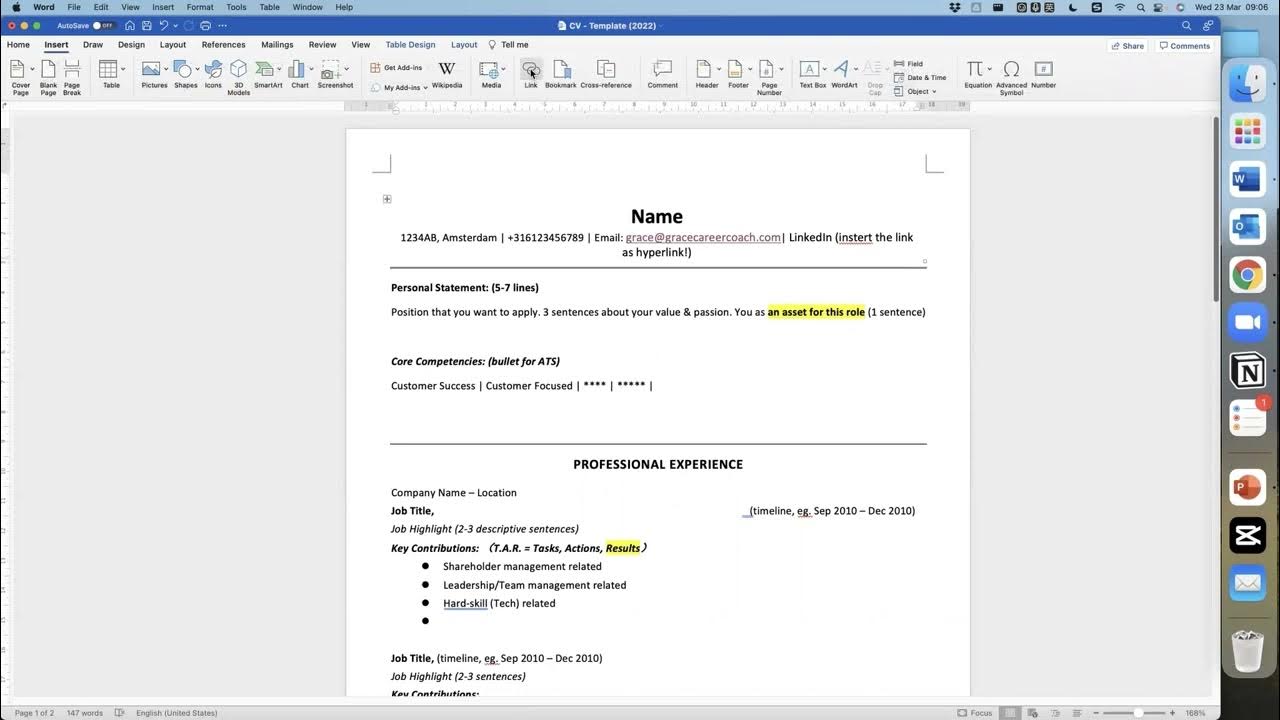How to write a powerful CV
Summary
TLDRThis video provides a comprehensive guide to creating a compelling CV tailored for the Dutch job market. It emphasizes the importance of customizing your CV for each position, highlighting relevant education, work experience, skills, and extracurricular activities. Key sections include personal information, a concise personal profile, education achievements, detailed work experience, skills, and interests. The video also offers practical tips on formatting and visual design, ensuring the CV is easy to skim and important information stands out. By following these guidelines, job seekers can present themselves effectively, showcasing both professional qualifications and personal attributes to prospective employers.
Takeaways
- 😀 There is no perfect CV; it should be tailored to both the position and the applicant.
- 😀 Always consider what you want the employer to think of you after reading your CV.
- 😀 Personal information should include contact details, date of birth, and a professional photo if appropriate.
- 😀 A personal profile should briefly summarize who you are, your value, and your ambitions.
- 😀 Education should be listed from most recent to oldest, highlighting key achievements in up to three bullet points.
- 😀 Work experience should include job titles, responsibilities, and primary tasks, sorted by relevance.
- 😀 Extracurricular activities are important in the Netherlands and should demonstrate skills, interests, and achievements.
- 😀 Skills that do not fit other sections, such as languages, software, or specialized knowledge, should be included in a separate section.
- 😀 Interests and additional information provide personal context and should be shared thoughtfully.
- 😀 Visual design matters: make the CV easy to skim, highlight important information, and maintain a consistent style.
- 😀 Tailoring your CV to the specific employer and role increases your chances of making a strong first impression.
- 😀 Use bullet points and concise descriptions to clearly communicate your achievements and relevant skills.
Q & A
Why is a CV considered the most important document in a job application?
-A CV is the key document that employers use to assess your suitability for a position. It presents your education, experience, skills, and personal qualities, helping the employer decide whether to invite you for an interview.
Is there a perfect CV that works for every job application?
-No, there is no perfect CV. The ideal CV depends on the specific position and the individual applying. It should be tailored to highlight the most relevant information for each job.
What is the first step in tailoring a CV for a specific job?
-Start by asking yourself what you want the employer to think of you after reading your CV. This helps determine what to include, emphasize, or remove.
Which personal information should be included in a CV?
-Include basic details such as your date of birth and contact information. Adding a professional photo is optional and depends on the position and company.
What should be included in the personal profile section of a CV?
-The personal profile should briefly describe who you are, what you have to offer, and what your ambitions are, typically in just a few sentences.
How should educational achievements be presented in a CV?
-Start with your most recent education and work backward. Include key results in no more than three bullet points, such as high grades, relevant courses, thesis, or minors.
What is the recommended approach for listing work experience?
-Include relevant internships or jobs, stating your title, responsibilities, and main tasks. Use bullet points and sort them by relevance, with the most important first.
Why are extracurricular activities important in the Netherlands?
-Extracurricular activities reveal skills, interests, and personality traits outside of academics. They help employers understand your broader capabilities and character.
What should be included in the skills section of a CV?
-List skills relevant to the position, such as languages, software, training, or specialist expertise. Make sure each skill has clear significance for the job.
How can the design of a CV affect an employer's decision?
-Visual design is crucial because employers often make a decision within the first 30 seconds. A CV should be easy to skim, with important information highlighted using bold or underlined text while keeping a consistent style.
What is the purpose of the 'interests and additional information' section?
-This section provides personal background to help employers understand what kind of person you are. It should be chosen carefully to reflect your personality and relevant traits.
How should bullet points be used throughout a CV?
-Use bullet points to clearly present achievements, tasks, and activities. They make information easier to read and help emphasize key points for the employer.
Outlines

This section is available to paid users only. Please upgrade to access this part.
Upgrade NowMindmap

This section is available to paid users only. Please upgrade to access this part.
Upgrade NowKeywords

This section is available to paid users only. Please upgrade to access this part.
Upgrade NowHighlights

This section is available to paid users only. Please upgrade to access this part.
Upgrade NowTranscripts

This section is available to paid users only. Please upgrade to access this part.
Upgrade NowBrowse More Related Video

CV -- Before you start for your

GUIDE TO WRITING A CV OR RESUME FOR GRADUATE JOBS & INTERNSHIPS | no work experience? fear not!

Herramientas TIC para la búsqueda de empleo

Cara Membuat CV Yang Menarik dan ATS Friendly (Update 2024). GRATIS TEMPLATE!

Chapter 1 : Job vacancy, CV and Application Letter ( By Pojok English )

How to make Australian Format CV For FREE - Australian Resume
5.0 / 5 (0 votes)